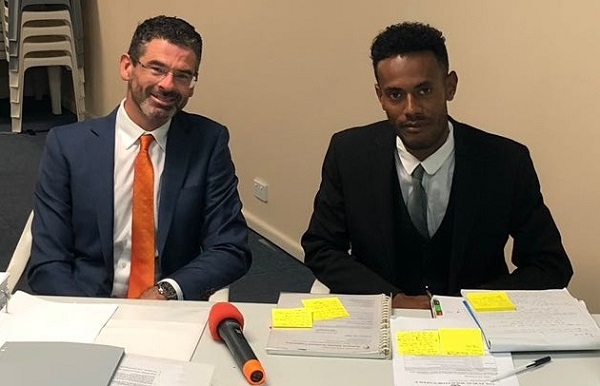The peoples of Wagina in Solomon Islands have won a historic battle against a proposed bauxite mine development, which would have taken up 60% of their island home and created unacceptable and irreversible environmental impacts, threatening around 2000 residents who rely on the sea and land for their livelihood.
After over a year of deliberation, the Minister for Environment dismissed the developer’s appeal, which sought to overturn the decision of the Environment Advisory Committee (EAC) refusing consent for the mine.
In March 2019, we reported on the EAC decision, a first in Solomon Islands’ history. A link to our earlier blog post on the EAC decision can be found here.
The International Program of EDO supported the Landowners Advocacy and Legal Support Unit (LALSU) within the Solomon Islands Public Solicitor’s Office (PSO) to bring the historic case to the EAC, representing Mr Tebukewa Mereki on behalf of the peoples of Wagina.
The Wagina residents had been fighting against the bauxite mine since 2013, after discovering the scale of the proposal and the implications for their island, their community and their livelihoods. The mine would have taken up 48km2 (i.e. 60%) of their island home and involved clearing 2000 hectares of virgin forest. The clearing would have had significant impacts on the local fish, fauna, genetic material and habitat.
The bauxite mining operations would have involved the development of an airport, roads, excavation and trucking of approximately 150 truckloads (of 30-50 tonnes per load) per day, for 20 years. Overall, the mine was expected to produce between 24 billion to 40 billion kilograms of ore body from Wagina over 20 years, with 16 hours per day operation.
For the more than 2000 people who call Wagina home, the mine would have had dramatic and probably irreversible impacts on their livelihoods, including the ability to access adequate food, shelter and other resources. In addition, the peoples of Wagina would have lost land for gardens and timber and material for crafts and arts.
Despite the mine’s significant environmental and social issues and the developer’s flawed consultation process, the Director for Environment and Conservation had approved the mine in 2013, but this was overturned in the first ever merits decision by the EAC in 2019, the first time it had convened since the Environment Act came into operation in 1998.
The developer’s appeal grounds criticised the EAC’s process and findings, but while the Minister found that there were some issues with the EAC decision, it considered that those issues were not sufficient to disturb it. Importantly, the Minister rejected a ground which suggested that the EAC could not hear fresh expert evidence, which is key to environmental merits processes, where the decision-maker decides the environmental issues for itself based on the most recent evidence.

While this is not necessarily the end of the case, the Minister’s decision represents the end of the Environment Act appeal process, significantly narrowing the ability of the developer to change the outcome. The developer would have to convince the High Court of Solomon Islands’ that the Minister had made an error of law and would be unable to make any arguments about the merits of the mine.
The Minister’s decision has been reported in Solomon Islands as a “milestone in utilising environmental law”. The Minister’s decision, as the EAC decision, sets a precedent for good environmental decision-making in Solomon Islands and will provide good guidance to all the stakeholders in development proposals – communities, developers, lawyers and administrators – improving environmental outcomes.
LALSU/PSO solicitor, William Kadi, said: “The Minister’s decision was such a relief after such a long wait. This might not be the end of the battle but the decision is important and I am inspired to continue advocating for disadvantaged people and communities in Solomon Islands. We will see how it goes but I truly hope this decision ends this particular case”.
Acting International Program Manager Fleur Ramsay said: “We are thrilled by the outcome of this case, which is historically significant in Solomon Islands. This was not just a case about a bauxite mine, it was a case about the Wagina peoples who have a right to live in a healthy environment”.
It has been a long battle for Mr Merkei and the Wagina residents, who have been fighting against the mine since 2013. The peoples of Wagina, like most Indigenous peoples, rely on a healthy environment for their livelihoods. The stakes of the case for the Wagina residents were high, summed up in Mr Merkei’s words: “Wagina is our life…if they destroy Wagina, we have nowhere else to go”.
The peoples of Wagina, who are originally from Kiribati, have suffered a long history of environmental injustice, having been removed from their island homeland by colonial powers in the 1950s – apparently due to ‘overpopulation; but there have been suggestions that the relocation was related to nuclear testing in the Pacific. Prior to that, they had been moved from Southern Gilbert to Phoenix Islands. If the mine had been allowed to proceed, it would have compounded this historical, environmental injustice and dislocation.
The outcome of this case was a collaborative effort, made possible by a strong partnership between LALSU and EDO, EDO supporters and pro-bono assistance from the Australian Bar and pro-bono experts. Huge thanks must be extended to all who have worked on this matter within LALSU and EDO since this case started in 2013, LALSU’s pro-bono counsel over the years, Ms Fleur Ramsay, Ms Chistine Melis and Mr Trevor Wallwork, and pro-bono experts Dr David Boseto, Dr Sara Beavis, Dr David Hadley and Dr Barry Noller.
Also special thanks to Lewis Gordon of the Environmental Defender Law Center, Mr David Levin QC of the Victorian Bar, Ms Linda McSpedden, Ms Elaine Johnson, Ms Dianne Mackey, Ms Anna Glasby and Mr Jason Wu for their generous financial support for this case and our work with the PSO.





